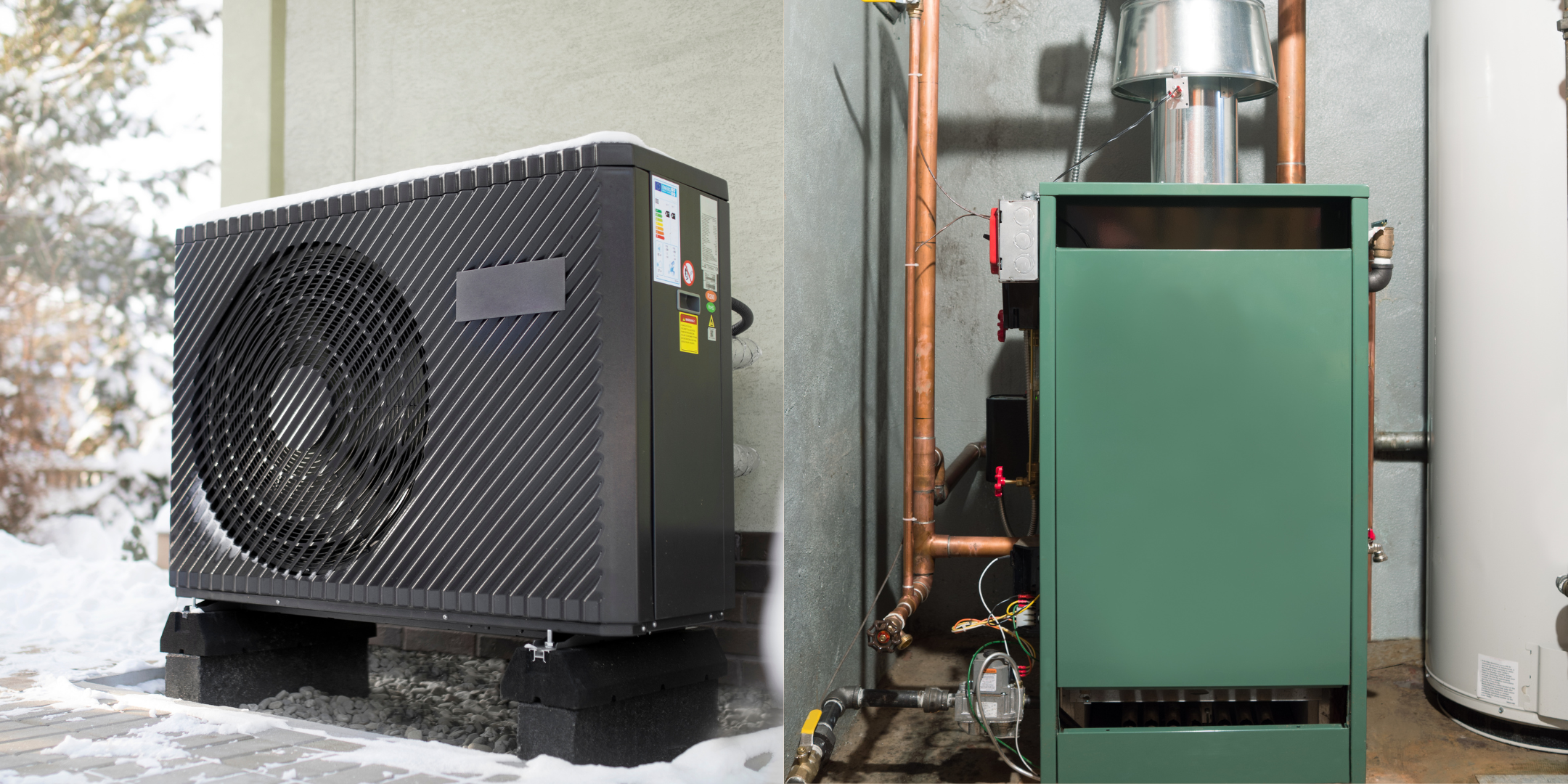What's the Difference Between a Heat Pump and a Furnace?
February 5th, 2025
3 min read
By Daphne Hunt

Choosing the right heating system can feel overwhelming. You want something that keeps your home warm, is cost-effective, and works well in your climate.
warm, is cost-effective, and works well in your climate.
With over 16 years of experience in the HVAC industry, we’ve helped countless homeowners navigate this decision. By the end of this article, you’ll feel confident in understanding the key differences between heat pumps and furnaces, so you can make the best choice for your home.
How Heat Pumps Work
A heat pump is a versatile HVAC system that provides both heating and cooling. Instead of generating heat, it transfers it from one place to another. Here’s how:
In winter, it extracts heat from the outdoor air (even in cold temperatures) and moves it inside. In summer, it reverses the process, acting like an air conditioner by removing heat from your home. Because it transfers heat rather than generating it, a heat pump can be more energy-efficient than a furnace, especially in moderate climates.
How Furnaces Work
A furnace generates heat by burning fuel (natural gas, propane, or oil) or using electricity. The process involves burning fuel or using electric coils to generate heat, with a blower fan circulating the warm air through ductwork. Efficiency varies depending on fuel type and the furnace’s Annual Fuel Utilization Efficiency (AFUE) rating.
4 Major Differences Between a Heat Pump and a Furnace
1. Energy Efficiency
Heat pumps use electricity and transfer heat, making them highly efficient, especially in moderate climates. Furnaces can also be efficient, but gas or oil models lose some energy in combustion. High-efficiency models (90%+ AFUE) minimize waste.
2. Performance in Cold Weather
Heat pumps work best in mild to moderate winters but lose efficiency in extremely cold temperatures (below 30°F). Furnaces perform well in all temperatures, making them a preferred option for very cold climates.
3. Cost and Installation
Heat pumps have a higher initial cost but lower operating costs due to efficiency. Furnaces often have a lower upfront cost but may have higher fuel costs over time.
4. Lifespan and Maintenance
Heat pumps typically last 10–15 years and require regular maintenance for both heating and cooling functions. Furnaces last 15–20 years and mainly require seasonal heating maintenance.
Which is the Best Choice for Oregon and Washington Residents?
Western Oregon & Washington (Portland, Vancouver, Eugene, Seattle, etc.)
Heat pumps are the best option because the moderate, damp climate means that extreme cold is rare. Heat pumps work efficiently for most of the year and provide air conditioning in summer, which is becoming increasingly necessary in the region.
Eastern Oregon & Washington (Bend, The Dalles, Spokane, Yakima, etc.)
Furnaces are the better choice in these areas due to harsher winters with temperatures well below freezing. Furnaces perform more reliably in these extreme conditions and offer stronger heating output when needed.
Coastal Regions (Astoria, Cannon Beach, Long Beach, etc.)
Heat pumps work well in coastal areas because they have milder winters, making them a cost-effective solution without the need for a high-BTU furnace.
Additional Considerations for Your Heating System
Electricity vs. Gas Availability
If you have natural gas access, a high-efficiency gas furnace may be a cost-effective heating solution.
If you rely on electricity, a heat pump will generally be more energy-efficient than an electric furnace.
Environmental Impact
Heat pumps reduce carbon emissions since they rely on electricity rather than fossil fuels. Furnaces, especially gas and oil models, produce more emissions, but high-efficiency versions can help mitigate impact.
Rebates & Incentives
Many utility companies and state programs in Oregon and Washington offer rebates for heat pumps and high-efficiency furnaces. Check with your local energy provider for available programs.
Who a Heat Pump Right is Right For
A heat pump is an excellent choice if you live in a mild or moderate climate where winters are not too harsh. Because it is an energy-efficient, all-in-one heating and cooling system, it provides year-round comfort while keeping energy costs low.
If you prefer to rely on electricity rather than fossil fuels and want to reduce your carbon footprint, a heat pump is a sustainable option that aligns with these priorities. Additionally, homeowners looking for a long-term cost-saving solution with lower operational expenses will find that heat pumps provide consistent savings over time.
If you live in a mild or moderate climate, want an energy-efficient, all-in-one heating and cooling system, prefer to rely on electricity rather than fossil fuels, and want lower overall heating costs, a heat pump is the right choice.
Who a Furnace is Right For
A furnace is ideal for homeowners in regions with extremely cold winters where heating demands are much higher. If your home has an existing gas line and you prefer a dedicated heating system with powerful performance, a furnace is the better choice.
It provides a longer-lasting, reliable heating solution that can efficiently generate high BTU output, ensuring warmth in even the coldest conditions. For those who value durability and a system that requires less frequent maintenance, a furnace is a dependable investment that delivers consistent and effective heating.
If you live in a region with extremely cold winters, have an existing gas line and prefer a dedicated heating system, want a longer-lasting, reliable heating solution, and require high BTU heating output, a furnace is the better option.
Making the Best Choice for Your Home’s Heating Needs
When you first started reading, you may have felt unsure about whether a heat pump or a furnace would be the best investment for your home. Now, you have the knowledge to compare these two heating systems based on climate, efficiency, and cost.
the best investment for your home. Now, you have the knowledge to compare these two heating systems based on climate, efficiency, and cost.
HVAC decisions can be daunting. For the last 16 years, our team of professionals have helped homeowners just like you make the best choice for your comfort and budget.
To explore a deeper breakdown of the pros, cons, and costs of each system, check out our in-depth guide: "Heat Pumps vs. Furnaces: Pros, Cons, and Cost." With the right choice, you’ll create a warm, cost-effective, and energy-efficient home for years to come.
Daphne Hunt holds a bachelor's degree in English and Mass Communication and has a lifelong passion for writing. She thrives on using her skills to craft compelling pieces that inform, inspire, and connect with readers.
Topics:



